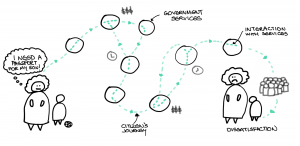Fellowship Opportunity |

Do you have an idea on #ICT #ICT4D which you’d like to explore? Submit your idea to the CIPESA-ICT4Democracy #Media or #Academia Fellowship Programme. The next deadline is April 1st!! See links below
Media: http://bit.ly/2GaOyyx
#ICT4DemEA
Promoting Public Accountability in Education and Agriculture Sectors in Rwenzori Region
News Update|
The agriculture and education sectors are identified among the primary growth sectors in the Uganda’s National Development Plan. However, despite consistent state budget allocation increments in recent years and high absorption rates, various challenges persist at implementation and service delivery. For instance, in the Financial Year 2015/16, the education sector under primary education, planned to construct 22 primary schools and 200 classrooms but only one school and two classrooms were constructed. Indeed, in the Rwenzori region in western Uganda, citizens are decrying poor services under government programmes.
Continue Reading →
Solving Uganda’s Challenges through Data & Service Design
By Neema Iyer
Last week, we asked “What is Service Design?” and answered our question with “Service design is the process of taking a service and better tailoring it to the needs and wants of the end user, whether that’s a client, customer or in the case of civic service design, the citizen. It could be improving an existing service, or creating a new service totally from scratch.”
On December 5th, Pollicy and the Collaboration in International ICT Policy for Eastern and Southern Africa (CIPESA) brought back the civic technology community in Uganda, but this time, with a focus on data and design. As issues of data ownership, digital security, censorship become more pertinent in our society, so does the need to appropriately harness the benefits of big data. Through a series of interesting panel discussions, lightening talks and a hands-on design training, we took participants through a journey on how data can be used to revolutionize how citizens and governments interact for mutual benefit.
Harnessing the Data Revolution for National Development: The Case of Uganda
By Loyce Kyogabirwe|

The United Nations (UN) has recognised data as a key factor for achieving and monitoring sustainable development. Indeed, the push for open data that contributes to government transparency and accountability and promotes citizens’ right to information and innovation through the Information and Communication Technology (ICT) sector continues to gain prominence globally, including in Africa.
In Uganda, the government is geared towards contributing to the emerging data revolution for sustainable development. Since 2016, the country has been party to the African Charter of Statistics and is also working to implement the UN Fundamental Principles of National Official Statistics as well as the Cape Town Action Plan. Uganda has also developed the National Development Plan and is party to regional development agendas such as Agenda 2063 and the East African Community’s Vision 2050.
Continue Reading →
Use of ICT to Improve the Health of Preterm Infants in Kenya
Neonatal mortality remains a key issue of public health concern in Kenya and currently stands at 22 per 1,000 live births [2]. Premature births (less than 37 completed weeks of gestation) accounts for 12% of all under 5 mortality in Kenya and approximately over 180,000 infants in Kenya are born prematurely every year [3]. Preterm infants need admission to a Neonatal Intensive Care Unit (NICU) where care is mainly focused on infants thus neglecting the role of mothers. Most mothers of infants born prematurely often suffer from depression, grief, and guilt, which are rooted in not giving birth to a healthy baby [1,10]. Extended periods of separation from the baby, the absence of information or lack of understanding, loss of parental roles, fear of possible outcome and lack of communication with health care providers aggravate the difficulties experienced by mothers regarding prematurity [9, 10].
Continue Reading →
What is Civic Service Design? A tale of Citizen Satisfaction in Uganda and beyond
By Neema Iyer
As a taxpayer in Uganda, trying to access services that you are fully entitled to can be a serious headache. Take for example, the process of procuring a passport for the first time. Most of us have been there and might prefer to get a root canal procedure instead of repeating the process. You may say that these processes were designed without any direction. And you might be right!
Civic Technology in Uganda: A Data & Design Perspective
Workshop |

Are you a techie that’s looking to harness technology and design for the public good? Are you part of a government department or civil society organization interested in how data can improve public service delivery? Want to know what “service design” is all about? Then, this is the event for you!
We have partnered with Pollicy, a civic technology organisation and are excited to bring you the latest in civic technology in Uganda, with a focus on data and design. As issues of data ownership, digital security, censorship become more pertinent in our society, so does the need to appropriately harness the benefits of big data.
Study Reveals that a Culture of Secrecy Among Public Officials Hinders Media Work in Tanzania
By MISA Tanzania Correspondent |
A prevailing culture of secrecy among public officials in Tanzania at both central and local government levels is hindering the work of journalists, according to findings by a recent study. This is affecting access to information necessary for media reporting towards increased civic participation, transparency and accountability in governance.
The study which was conducted by the Media Institute of Southern Africa (MISA) Tanzania Chapter in partnership with the Collaboration on International ICT Policy for East and Southern Africa (CIPESA) assessed the responsiveness of local government authorities (LGAs) and central government offices in Tanzania to citizens’ information requests.
Continue Reading →
Access to Public Information in Uganda: Rhetoric or Reality?
By Loyce Kyogabirwe
Norah Owaraga, a Ugandan researcher, recently narrated her experience on accessing government-held information in the country. She recounted a trip to Tororo district in eastern Uganda where she sought information on Tuberculosis prevalence in prisons. “I was told to go back to the prisons headquarters in Kampala (the capital) to get authorisation yet I had already received clearance from Uganda National Council for Science and Technology (UNCST) and the President’s Office to access government information. Why did I have to travel back to Kampala when I had all the clearance?” asked Owaraga.
Her question was directed at Frank Baine, the spokesperson of Uganda Prisons, during a dialogue held in Kampala to commemorate the International Day for Universal Access to Information, which falls on September 28.
Continue Reading →
Stimulating the Civic Tech Arena in Uganda
By Daniel Mwesigwa
For many citizens across Africa, technology has not only bridged the communication gap between citizens and businesses, but also between governments and citizens. The potential of technology in enabling citizens to participate in governance processes, access public services, and engage with duty bearers has largely gained prominence due to the high internet penetration rates, increasing use of social media and a rise in civic consciousness.
At a recent civic tech showcase in Uganda, it emerged that, as in the rest of Africa, there was growing potential and enthusiasm in the country, with a wide variety of tools deployed by government, civil society and technologists to facilitate social accountability and citizen journalism. The challenge however, remains of creating awareness among citizens for wider adoption of the tools and collaboration among actors to ensure synergies and avoid duplication of efforts.
Continue Reading →

